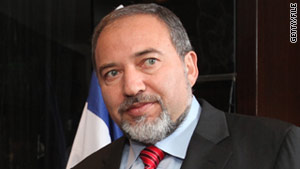June 14, 2011 5:50 a.m. EDT

Israel's foreign minister Avigdor Lieberman (pictured) says he has no idea why Ilan Grapel, 27, should be detained.
STORY HIGHLIGHTS
- NEW: The aid agency Ilan Grapel was working for says it had no reason to be suspicious
- Foreign Minister Avigdor Lieberman says he has no idea why Grapel was detained
- The law student and former Israeli paratrooper was apprehended and questioned Sunday
- He will be held for 15 days, Egyptian officials say
Avigdor Lieberman has no idea why Ilan Grapel, 27, should be detained, he told Israel Radio.
Grapel was apprehended Sunday and ordered held for 15 days on suspicion of spying for Israel, said Adel Saeed, a spokesman for Egypt's general prosecutor.
Grapel was taken into custody in a five-star hotel in downtown Cairo, Saeed said Sunday. Grapel's mother said he had been staying at a $9-a-night youth hostel.
Grapel's mother denied Monday that her son was involved in espionage, saying: "Law students don't have time to be spies."
"There is no chance he's a spy," Irene Grapel said from her home in New York of her son, a former paratrooper in the Israel Defense Forces who holds dual U.S.-Israeli citizenship.
He worked briefly for St. Andrew's Refugee Services in Cairo, said its assistant director Fiona Cameron.
"Ilan Grapel worked for us for four days last week. We were unaware of his dual citizenship or of his military record," she told CNN Tuesday, saying he had been "thoroughly vetted before he came, though obviously not thoroughly enough."
The organization had had "no reason to be suspicious of his activities" for the four days he'd been with them, she said.
She learned of Grapel's detention from his friends when she called them to ask why he hadn't shown up for work, she said.
Cameron said St. Andrew's had been "pro-actively in touch with the Egyptian authorities" about his case. St. Andrew's Refugee Services seeks to help "the isolated and vulnerable refugee communities in Egypt to come together for empowerment, education, community development and social services," according to its website.
Grapel is a rising third-year student at Emory University School of Law in Atlanta, school officials said Monday in a statement. "We are in touch with his family and are working with them to provide support and assistance," it said.
He is involved in the Emory Public Interest Committee as well as Emory Law's Pro Bono program, working with Student Legal Services, it said.
He traveled May 10 to Cairo to volunteer at St. Andrews, his mother said.
Though Grapel was working without pay, he received a public-service grant from Emory, which has no link to the organization, his mother said.
Grapel's IDF work could have been what led Egyptian authorities to focus on him, his mother said. "He loves the Arab culture. He loves the Arab religion," she said.
Grapel speaks Arabic, which he studied at Johns Hopkins University in Baltimore, and he spent his junior year at Ben Gurion University in Israel.
"He gravitates toward Arabic-speaking students on campus so he can speak with them, simply to use the language," Irene Grapel said.
She said she spoke Monday morning with her son, who told her he was being held at a security center in Cairo.
Saeed, the general prosecutor spokesman, said Grapel had participated in the Lebanon war of 2006 and was relieved of field combat duties after being injured. Investigators had been following his activities for months, Saeed said.
The Israeli government allegedly sent Grapel to Egypt after the January 25 revolution to take advantage of the security vacuum that then existed by recruiting others to provide the Israelis with military and political information, Saeed said.
The revolution forced former Egyptian President Hosni Mubarak from power; he stepped down February 11.
The suspect, who was present at most of the protests, tried to incite sectarian violence between Muslims and Christians and encouraged demonstrators to engage in violence against the military, Saeed said. His goal was to foment chaos between the Egyptian people and the military, Saeed said.
The supreme state security prosecutor has questioned Grapel, and the general prosecutor will announce the results of the investigation when it is complete, Saeed said.
Egyptian newspapers carried the story on their front pages Monday alongside photos of Grapel republished from his Facebook account. "Egypt arrests Israeli Intelligence Officer, a big blow to the Israeli Mossad Intelligence Agency," one headline said.
Egypt and Israel signed a peace treaty in 1979.
The United States has been granted consular access to Grapel and is following the investigation to determine the exact charges, the State Department said Monday.
"We've confirmed that he was in good health, Mr. Grapel's family is aware of his arrest, and refer you to the government of Egypt for details on the charges against him," State Department spokesman Mark Toner said Monday.
The Egyptian authorities provided the United States with "almost immediate consular access" to Grapel, Toner said. "Our function, as they would in that case of any American citizen held overseas, is to provide them with consular services, work with local authorities to make sure he's being treated fairly under local law, provide information about the local legal system and facilitate communication with his family and friends."
CNN's Diana Magnay, Paul Colsey, Kevin Flower, Jamie Crawford and Tom Watkins and journalist Mohamed Fadel Fahmy contributed to this report.